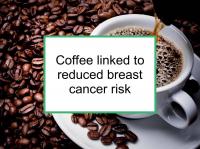Evidence regarding coffee consumption and breast cancer risk is inconsistent. Coffee has numerous compounds that have been reported to reduce this risk, including caffeic acid, caffeine, chlorogenic acid, trigonelline, hydroxyl hydroquinone, kahweol, and other polyphenols and volatile aroma and heterocyclic molecules.
Coffee is also a source of acrylamide, a suspected carcinogen. Sorting out the relative contributions of these compounds to risk is challenging. In addition, women can vary greatly in their responses to coffee. These variations appear to be based primarily on hormonal and genetic factors. However, while the evidence is mixed, several studies have reported that caffeinated coffee consumption is associated with reduced risk of breast cancer after menopause. Now a new meta-analysis of previous studies has confirmed that coffee consumption is associated with lower risk of postmenopausal breast cancer.
Coffee should be avoided or limited in some circumstances
Women with benign fibrocystic breast disease should avoid coffee. Caffeine consumption is associated with higher risk of benign breast disease and also appears to heighten breast cancer risk among women with the disease. One study found statistically significant positive correlations between caffeine consumption and both ER-/PR- breast cancer and breast tumors greater than 2 cm in size for women with benign breast disease. Coffee also appears to increase breast density, a known breast cancer risk factor, among women undergoing treatment with hormone replacement therapy (HRT) or menopausal hormone therapy.
Coffee should be avoided during chemotherapy. Coffee and other sources of caffeine may reduce the effectiveness of anthracycline chemotherapy drugs such as doxorubicin. There is also some evidence that coffee could reduce the effectiveness of paclitaxel and other taxane chemotherapy as a result of its caffeic acid content.
High levels of caffeine consumption has been associated with higher risk of osteoporosis and therefore should be limited by many women taking aromatase inhibitors. This depends on whether bone mineral density is low or has been decreasing as a result of aromatase inhibitor treatment.
On the other hand, coffee has been reported to reduce the risk of breast cancer among BRCA2 mutation carriers. Moderate to high coffee consumption was also found to be associated with significantly lowered risk of recurrence in tamoxifen-treated breast cancer patients in one Swedish study.
Study reports reduced risk among postmenopausal coffee drinkers
The meta-analysis of previous studies referenced above was designed to investigate the associations between coffee consumption and risk of breast cancer. To conduct the study, the authors combined data from 21 prospective studies. Overall and subgroup analyses were performed, taking into account menopausal and hormone receptor (ER/PR) status, smoking and body mass index.
Consistent with previous findings, no clear link was found between coffee consumption and breast cancer risk in the overall combined study population. However, when the analysis was restricted to postmenopausal women, an inverse relationship was found between coffee consumption and risk. Consumption of four cups of coffee per day was found to be associated with 10% lower risk of breast cancer in postmenopausal women. The results held when potential confounding factors were examined. The authors conclude that coffee consumption is associated with reduced risk of postmenopausal breast cancer.
